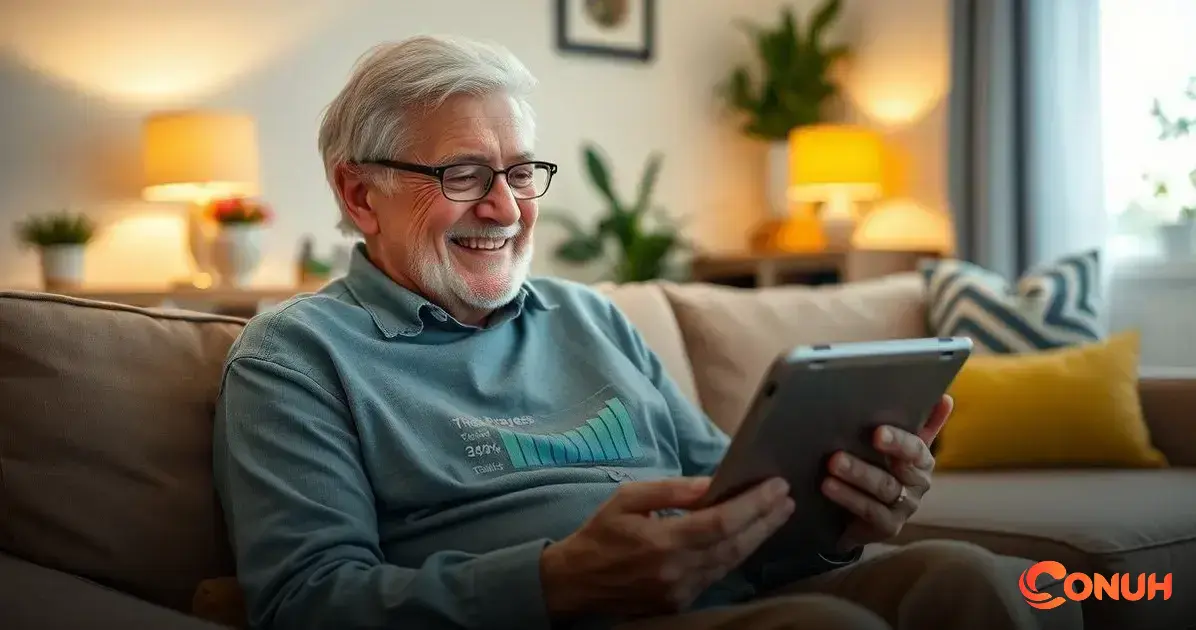ADVERTISEMENT
Health tracking apps for seniors play a vital role in promoting wellness and managing health effectively. These tools help older adults monitor their fitness, medication, and vital signs easily. With technology evolving rapidly, accessible health solutions are now at seniors’ fingertips.
Many seniors may feel overwhelmed by technology, but these apps are designed with user-friendliness in mind. They often feature large text, simple interfaces, and guided setups to ensure a smooth experience. Moreover, the benefits extend beyond monitoring; these apps often encourage a healthier lifestyle.
ADVERTISEMENT
Keep reading to discover how the right app can enhance your well-being and empower you to take control of your health!
Understanding Health Tracking Apps
Understanding health tracking apps is the first step to better wellness for seniors. These apps help older adults monitor many aspects of their health, such as steps taken, heart rate, and even medication schedules. With just a few taps, seniors can track important health metrics.
Many health tracking apps also allow users to set goals and reminders, making it easier to stay motivated. For example, a senior can set a daily step goal or receive alerts to take their medication on time. These features encourage regular physical activity and adherence to health plans.
With user-friendly designs, health tracking apps are accessible for seniors with varying levels of tech experience. Simple interfaces, large buttons, and clear instructions help users navigate the app easily. This makes keeping track of health not only convenient but also enjoyable.
Top Features for Seniors
Top features for seniors in health tracking apps focus on usability and accessibility. One key feature is the large text size. This helps seniors easily read information such as their daily steps or medication reminders. Clear visuals and simple layouts make the app approachable for everyone, regardless of their tech skills.
Another important feature is customizable alerts. Seniors can set reminders for medication, doctor appointments, or even exercise times. These notifications help them stay on track with their health goals. Having these reminders can lead to better health management and increased independence.
Some apps also include health monitoring tools. This may involve tracking blood pressure, heart rate, or even blood sugar levels. These features give seniors and their caregivers valuable insights into their health. This information can help them make informed decisions about their wellness journey.
Benefits of Using Health Apps

The benefits of using health apps for seniors are significant. First, these apps help individuals keep track of their health metrics conveniently. Whether it’s monitoring steps, calories, or medication, having all this information in one place simplifies health management. With easy access to daily data, seniors can make informed choices about their lifestyles.
Another major benefit is the increased motivation that comes with using health apps. Many apps allow seniors to set personal goals and celebrate their achievements. For example, reaching a step target or consistently taking medications can boost confidence and promote a sense of accomplishment. This motivation encourages them to stay active and engaged with their health.
Finally, health apps can improve communication between seniors and their healthcare providers. By sharing health data from these apps, doctors can gain insights into their patient’s daily habits and trends. This information facilitates better discussions during appointments and promotes proactive health management. Overall, health apps can enhance senior wellness in multiple ways.
Simple Navigation and Usage
Simple navigation and usage are crucial features of health tracking apps for seniors. Developers design these apps with large buttons and clear labels to make everything easy to find. Seniors can quickly access their health data without getting lost in complicated menus. This focus on user-friendly design ensures that apps are welcoming and not frustrating.
Many apps provide guided instructions and tutorials to help seniors learn the basics. For instance, a tutorial might show how to log daily activity or enter medication details. These step-by-step guides create a sense of comfort and confidence as users become familiar with the app’s functions.
Another helpful feature is the ability to personalise the interface. Seniors can often choose display settings that suit their needs, like changing text size or colour contrast for better visibility. This level of customization allows for a more tailored experience, helping seniors feel more in control of their health journey.
Choosing the Right App
Choosing the right health tracking app is essential for seniors looking to enhance their wellness. Start by considering what features are most important. Some seniors may want an app that focuses on exercise, while others might need one that helps track medications. By identifying specific needs, users can narrow down their options and find an app that fits their lifestyle.
Reviews and ratings can be very helpful in the decision-making process. Checking user feedback often provides insights into how easy an app is to use and its effectiveness. Look for apps specifically designed for seniors, as these are often more user-friendly and tailored to their unique requirements.
Lastly, consider testing a few apps before making a final choice. Many health tracking apps offer free versions or trials, allowing users to explore different interfaces and features. Trying out several options can help seniors feel confident about their decision, ensuring they select an app that will truly support their health goals.
Popular Health Tracking Apps
![]()
Several popular health tracking apps cater specifically to seniors, making it easier for them to manage their health. One well-known app is MyFitnessPal, which helps users track their meals and exercise.
This app allows seniors to set goals for weight loss or maintenance and provides insights into their nutritional intake. It is user-friendly and comes with a large food database that makes logging meals simple.
Another great option is Fitbit, which connects with its wearable devices to monitor daily activity. The app also tracks sleep patterns and provides reminders to stay active throughout the day. Seniors can join challenges and engage with friends, making fitness more enjoyable and motivating.
Lastly, Medisafe is an excellent app for managing medications. It sends reminders for when to take pills and helps users keep track of their prescriptions. This feature is especially helpful for seniors who need to manage multiple medications. With intuitive navigation, seniors can feel confident using this app to ensure they never miss a dose.
How Apps Improve Health Management
Apps improve health management for seniors by simplifying the tracking of vital information. Whether it’s daily activity, water intake, or medications, users can monitor everything in one place. This convenience helps seniors see their progress and encourages them to stick to their health goals.
Additionally, many health apps provide insightful reminders and notifications. For example, reminders for medication times or alerts to get up and move help seniors stay on top of their health routines. By keeping these tasks at the forefront, health apps make it easier to develop and maintain good habits.
Finally, health apps create opportunities for sharing information with healthcare providers. Seniors can easily send data about their health metrics, which helps doctors make informed decisions. This connection enhances the overall management of healthcare, leading to better outcomes and a more proactive approach to health.
Privacy and Security Considerations
When using health tracking apps, privacy and security are important considerations, especially for seniors. Many apps collect personal health information, and users should understand how this data is used. Choosing apps with clear privacy policies can help seniors feel safer about sharing their information.
It is crucial to look for apps that offer strong security features. These may include data encryption, password protection, and two-factor authentication. Such features help keep sensitive health information safe from potential breaches or unauthorized access, providing peace of mind for users.
Additionally, seniors should regularly review the permissions they grant to health apps. It’s wise to limit access to only necessary information and features. By staying informed about privacy settings, seniors can maintain better control over their health data and ensure that it is shared only when they feel comfortable.
Future Trends in Health Tracking
![]()
The future trends in health tracking apps are promising, especially for seniors. One exciting development is the integration of artificial intelligence. AI can provide personalized health tips and feedback based on the data that users enter into the app. This means seniors can receive suggestions that are specific to their health needs, making it easier to manage their well-being.
Another trend is the use of wearable technology that connects with health apps. Devices like smartwatches can monitor heart rate, sleep patterns, and activity levels in real-time. As these technologies improve, seniors can get more accurate health information that helps them stay proactive about their health.
Lastly, there is a growing focus on community features within health apps. Many apps are beginning to include social elements that allow seniors to connect with others who share similar health goals. This can foster motivation, support, and a sense of belonging, making health management a more engaging experience.
Health tracking apps for seniors are designed to improve overall well-being and make health management easier. These apps allow users to keep track of key health data like steps taken, calories consumed, and medications taken. With this information readily available, seniors can make informed choices about their health on a daily basis.
Moreover, these apps often come with features that help monitor vital signs such as heart rate and blood pressure. Regularly tracking these metrics empowers seniors to notice trends and seek medical attention when necessary. This proactive approach can lead to early detection and better health outcomes.
Finally, many health tracking apps provide access to educational resources and support communities. Seniors can learn about healthy living, get tips on exercise, and connect with others who share similar health challenges. This sense of community can motivate seniors to stay engaged and committed to their health goals.






